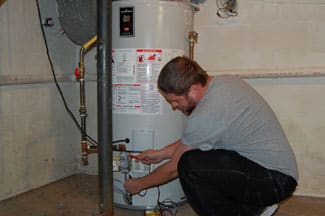We've found this article relating to Water Heater Repair and Troubleshooting down the page on the internet and reckoned it made good sense to write about it with you here.

Visualize starting your day without your regular hot shower. That currently establishes a poor tone for the rest of your day.
Every residence requires a reliable hot water heater, but just a few understand just how to take care of one. One easy way to keep your water heater in top shape is to check for mistakes regularly and fix them as soon as they show up.
Remember to turn off your hot water heater prior to smelling about for mistakes. These are the hot water heater mistakes you are probably to run into.
Water also warm or too cold
Every water heater has a thermostat that establishes just how hot the water gets. If the water coming into your residence is also warm in spite of setting a practical maximum temperature level, your thermostat could be damaged.
On the other hand, as well cold water might be because of a stopped working thermostat, a broken circuit, or inappropriate gas circulation. For example, if you make use of a gas water heater with a broken pilot burner, you would obtain cold water, even if the thermostat remains in ideal problem. For electric heating systems, a blown fuse may be the wrongdoer.
Inadequate warm water
Water heaters can be found in numerous dimensions, depending on your warm water demands. If you run out of warm water prior to everyone has actually had a bathroom, your water heater is too little for your family size. You need to consider mounting a bigger water heater tank or selecting a tankless hot water heater, which occupies much less room and also is more durable.
Strange noises
There are at least five kinds of sounds you can learn through a hot water heater, however the most typical interpretation is that it's time for the water heater to retire.
First off, you need to recognize with the regular seems a water heater makes. An electric heating system may sound various from a gas-powered one.
Popping or banging sounds generally indicate there is a slab of debris in your containers, as well as it's time to cleanse it out. On the other hand, whistling or hissing noises may just be your shutoffs allowing some stress off.
Water leaks
Leakages might originate from pipes, water connections, valves, or in the worst-case circumstance, the tank itself. In time, water will corrode the storage tank, as well as find its escape. If this happens, you need to change your hot water heater immediately.
Nonetheless, before your modification your entire container, make sure that all pipes remain in place and that each shutoff functions flawlessly. If you still need help determining a leakage, call your plumber.
Rust-colored water
Rust-colored water suggests one of your water heater components is rusted. It could be the anode rod, or the storage tank itself. Your plumber will have the ability to determine which it is.
Warm water
Regardless of exactly how high you established the thermostat, you will not obtain any type of hot water out of a heating unit well past its prime. A water heater's effectiveness may reduce with time.
You will certainly additionally obtain lukewarm water if your pipes have a cross link. This means that when you activate a faucet, hot water from the heater moves in together with regular, cold water. A cross link is simple to spot. If your warm water taps still run after closing the hot water heater valves, you have a cross link.
Discoloured Water
Rust is a significant root cause of dirty or discoloured water. Rust within the water tank or a falling short anode rod might cause this discolouration. The anode pole safeguards the container from rusting on the inside as well as need to be inspected annual. Without a pole or an appropriately operating anode rod, the hot water promptly corrodes inside the storage tank. Contact a professional hot water heater professional to identify if replacing the anode rod will certainly take care of the issue; if not, change your water heater.
Verdict
Preferably, your hot water heater can last 10 years prior to you need a modification. Nonetheless, after the 10-year mark, you may experience any of these mistakes a lot more regularly. At this point, you should include a brand-new water heater to your budget.
How To Troubleshoot 3 Common Water Heater Problems in Twin Cities
The Water Heater Is Leaking
- A leaky cold water inlet valve
- A loose pipe fitting
- A leaky temperature and pressure relief valve
- A corroded anode rod
- A cracked tank
Turn Off Your Water Heater:
- Shut off your gas water heater by turning the gas valve on the unit to the “OFF” position.
- Shut off your electric water by switching its power off at your electrical panel. Look for a two-pole breaker labeled “water heater” and turn it to the “OFF” position. Move the ball valve connected to the water heater to be perpendicular to the piping at a 90° angle.
Look for the Leak:
Depending on whether the water is coming from the tank's top or bottom, you’ll want to look for the leak in different locations.
If the leak comes from the top of the tank, carefully look for water escaping from the cold water inlet valve or loose pipe fittings. Rusted hot and cold water valves can have loose connections with the tank, with water leaking out of them.
https://mspplumbingheatingair.com/blog/how-to-troubleshoot-3-common-water-heater-problems
I came across that post on Water Heater Repair and Troubleshooting when doing a search on the internet. Those who liked our page if you please don't forget to share it. Bless you for your time. Visit us again soon.
Apply Now
Comments on “Fixing Regular Heater Challenges”